setmodeは、標準入出力をバイナリモードに切り替えたり、テキストモードに戻したりする時に使う。
バイナリモード/テキストモードの切り替えに関する問題は、Windowsでしか起きないので、Windowsのみ用意されている。
(BSDにも同名関数があるが、機能が違う。)
で、これをよく使うのがWindowsのCGIなのだが、そのためにWindowsにもApacheを入れる。
Apache インストール (Windows編) - プログラミングスタイル
ダウンロードしたら、解凍して、
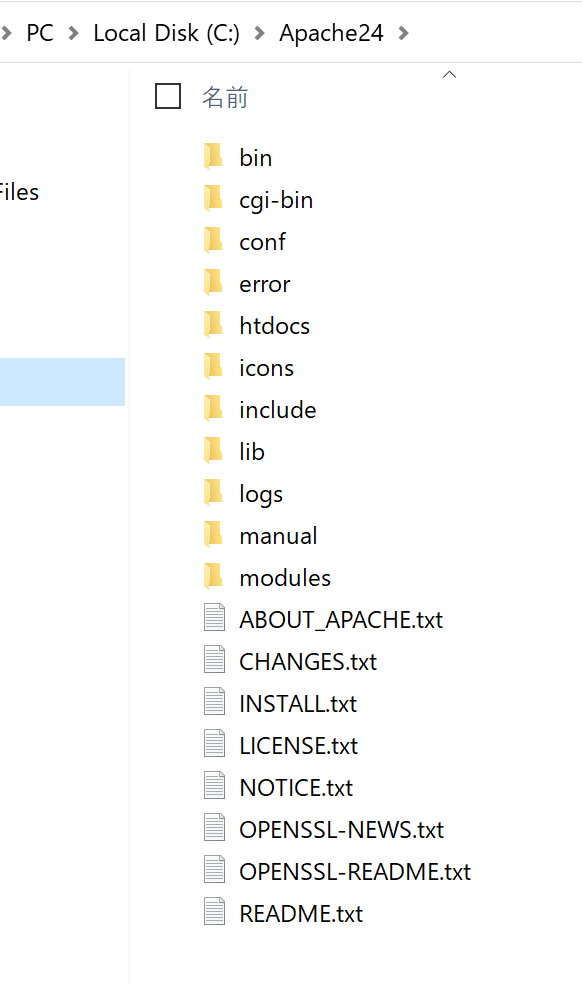
配置。
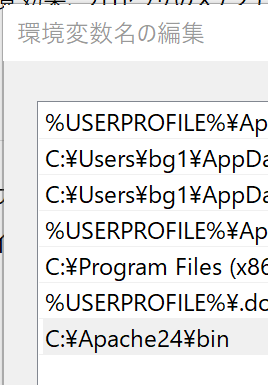
パスを通す。
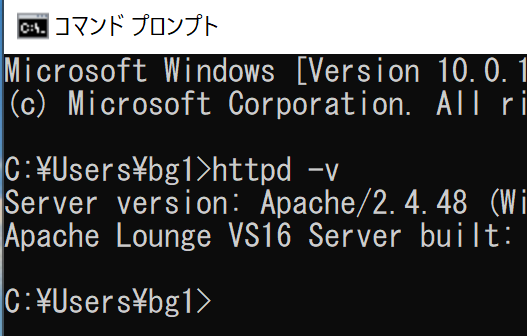
バージョンはこう出る。
httpd.confを見ると、
Define SRVROOT "c:/Apache24"
ServerRoot "${SRVROOT}"ServerRootはここ。
#ServerName www.example.com:80 ServerName localhost:80
ServerNameはひとまずlocalhostに修正。
DocumentRoot "${SRVROOT}/htdocs"
<Directory "${SRVROOT}/htdocs">DocumentRootはこうなっている。
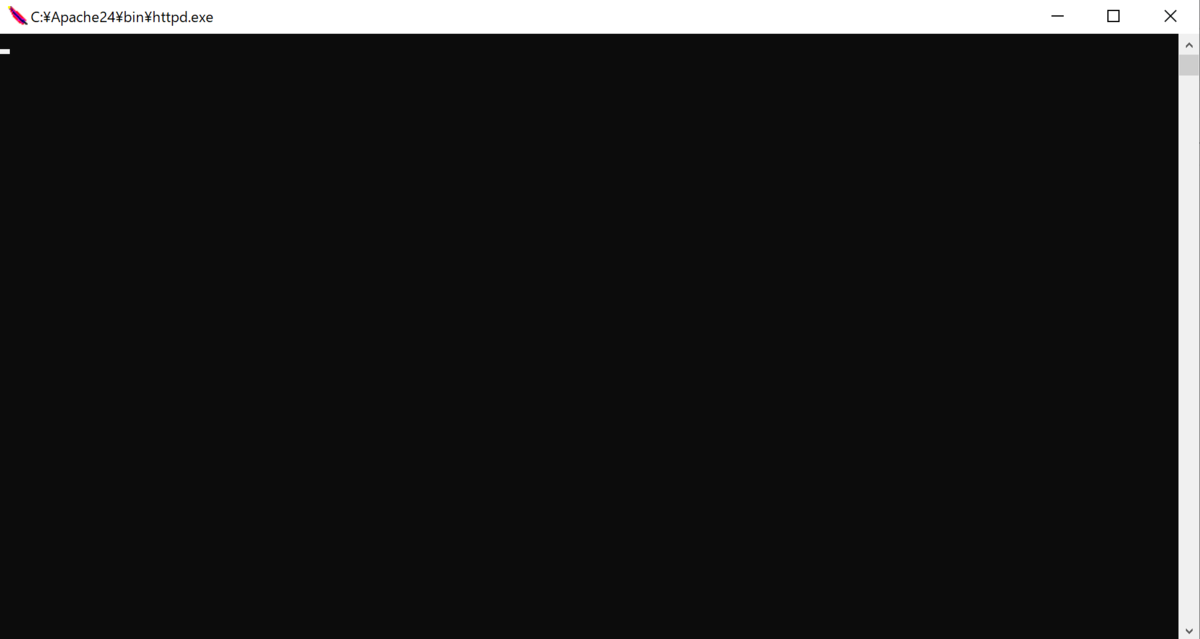
httpd.exeをクリックするだけで起動する。
管理者権限でコマンドプロンプトを起動し、

サービス登録。
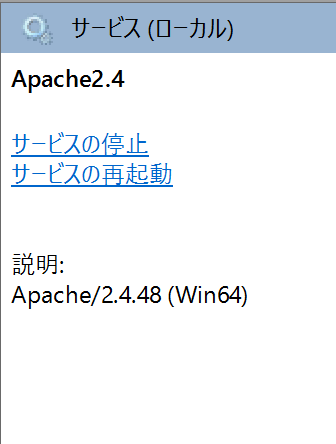
こうしておけば、こっから起動できる。

いつもの。
CGIはcgi-binフォルダに入れるだけで実行できるみたい。
VisualStudioでCGIを書く前に、

古い書き方だと引っ掛かるのでこれをいいえにしておく。
action.cで、
/* ヘッダファイルのインクルード */ #include <stdio.h> /* 標準入出力 */ #include <stdlib.h> /* 標準ユーティリティ */ #include <string.h> /* 文字列処理 */ /* main関数の定義 */ int main(void) { /* 変数の宣言・初期化 */ char* buf = NULL; /* char型バッファポインタbufをNULLで初期化. */ char* content_type = NULL; /* char型ポインタcontent_typeをNULLで初期化. */ char* p1 = NULL; /* char型ポインタp1をNULLで初期化. */ char* p2 = NULL; /* char型ポインタp2をNULLで初期化. */ char boundary[256] = { 0 }; /* char型バッファboundary(長さ256)を{0}で初期化. */ char* content_length = NULL; /* char型ポインタcontent_lengthをNULLで初期化. */ int len = 0; /* content_lengthを整数値に変換したものlenを0で初期化. */ char pattern[256] = { 0 }; /* 検索するboundary文字列pattern. */ int read_len = 0; /* 読み込めた長さread_len. */ char* p3 = NULL; /* char型ポインタp3をNULLで初期化. */ char* p4 = NULL; /* char型ポインタp4をNULLで初期化. */ char* p5 = NULL; /* char型ポインタp5をNULLで初期化. */ int ret = 0; /* memcmpの戻り値retを0で初期化. */ int i = 0; /* ループ用変数iを0で初期化. */ int rest = 0; /* コンテンツ先頭からファイル先頭までの無駄な部分のサイズrestを0で初期化. */ char file_content_type[256] = { 0 }; /* ファイルコンテントタイプ(長さ256)を{0}で初期化. */ char* file_buf = NULL; /* char型バッファポインタfile_bufをNULLで初期化. */ /* CGI処理. */ content_type = getenv("CONTENT_TYPE"); /* getenvでcontent_typeを取得. */ p1 = strstr(content_type, "multipart/form-data"); /* "multipart/form-data"を探す. */ if (p1 != NULL) { /* 見つかった場合. */ p2 = strstr(p1, "boundary="); /* "boundary="を探す. */ if (p2 != NULL) { /* 見つかった場合. */ strcpy(boundary, p2 + strlen("boundary=")); /* boundaryを取り出す. */ content_length = getenv("CONTENT_LENGTH"); /* getenvでcontent_lengthを取得. */ len = atoi(content_length); /* 整数値に変換. */ buf = (char*)malloc(sizeof(char) * (len + 1)); /* mallocでbufを確保. */ memset(buf, 0, len + 1); /* memsetでbufをクリア */ read_len = fread(buf, sizeof(char), len, stdin); /* freadで読み込み. */ if (len == read_len) { /* 一致 */ strcat(pattern, "--"); /* まず"--"をセット. */ strcat(pattern, boundary); /* boundaryを連結. */ p3 = strstr(buf, pattern); /* bufからpatternを見つける. */ if (p3 != NULL) { /* 見つかった場合. */ p4 = strstr(p3, "Content-Type: "); /* "Content-Type"を探す. */ if (p4 != NULL) { /* 見つかった場合. */ p5 = strstr(p4, "\r\n\r\n"); /* "\r\n\r\n"を探す. */ if (p5 != NULL) { /* 見つかった場合. */ strncpy(file_content_type, p4 + strlen("Content-Type: "), p5 - (p4 + strlen("Content-Type: "))); /* file_content_typeの抽出. */ rest = len - ((p5 + 4) - buf); /* restを計算. */ for (i = 0; i < rest; i++) { ret = memcmp(p5 + 4 + i, pattern, strlen(pattern)); /* 比較. */ if (ret == 0) { /* 一致 */ file_buf = (char*)malloc(sizeof(char) * (i - 1)); /* mallocでfile_bufを確保. */ memset(file_buf, 0, i - 1); /* memsetでfile_bufをクリア */ memcpy(file_buf, p5 + 4, i - 2); /* file_bufにコピー. */ printf("Content-type: %s\n", file_content_type); /* "Content-type: "でfile_content_typeを出力. */ printf("Content-length: %d\n", i - 2); /* "Content-length: "でi - 2を出力. */ printf("\n"); /* printfで改行を出力. */ fwrite(file_buf, sizeof(char), i - 2, stdout); /* 書き込み */ free(file_buf); /* 解放 */ break; /* 抜ける. */ } } } } } } free(buf); /* bufを解放. */ } } /* プログラムの終了 */ return 0; /* 0を返して正常終了. */ }
Linuxと同じ書き方だと、
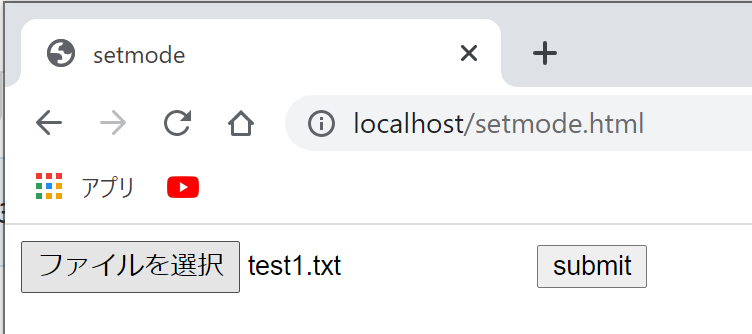
submit押すと、
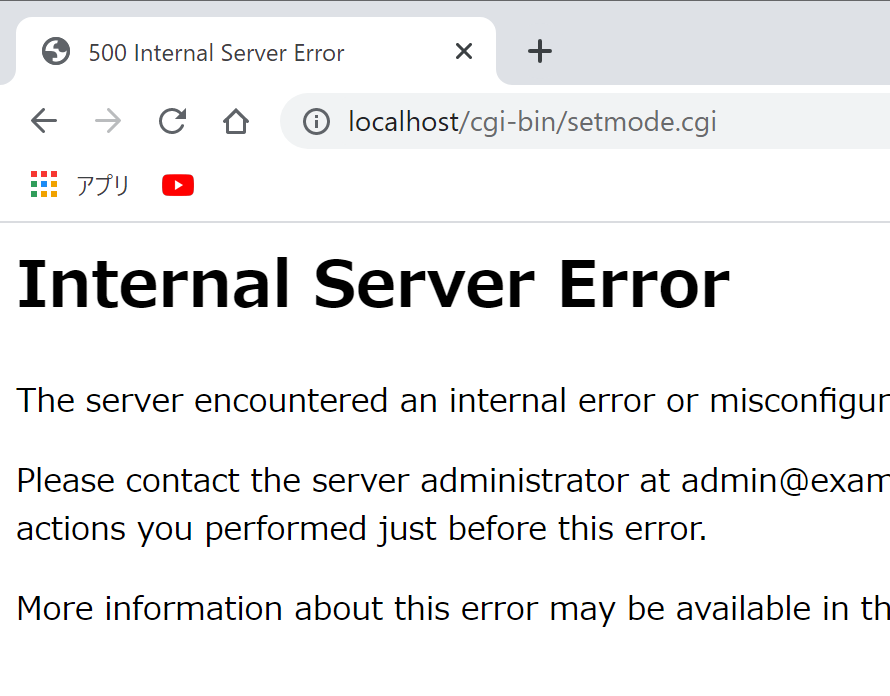
エラーになっちゃう。
Windowsはテキストモードだと読み込むデータに"\r\n"が入ってると"\n"に変換しちゃう。
なので、
/* ヘッダファイルのインクルード */ #include <stdio.h> /* 標準入出力 */ #include <stdlib.h> /* 標準ユーティリティ */ #include <string.h> /* 文字列処理 */ #include <fcntl.h> /* ファイル制御 */ #include <io.h> /* 入出力 */ /* main関数の定義 */ int main(void) { /* 変数の宣言・初期化 */ char* buf = NULL; /* char型バッファポインタbufをNULLで初期化. */ char* content_type = NULL; /* char型ポインタcontent_typeをNULLで初期化. */ char* p1 = NULL; /* char型ポインタp1をNULLで初期化. */ char* p2 = NULL; /* char型ポインタp2をNULLで初期化. */ char boundary[256] = { 0 }; /* char型バッファboundary(長さ256)を{0}で初期化. */ char* content_length = NULL; /* char型ポインタcontent_lengthをNULLで初期化. */ int len = 0; /* content_lengthを整数値に変換したものlenを0で初期化. */ char pattern[256] = { 0 }; /* 検索するboundary文字列pattern. */ int read_len = 0; /* 読み込めた長さread_len. */ char* p3 = NULL; /* char型ポインタp3をNULLで初期化. */ char* p4 = NULL; /* char型ポインタp4をNULLで初期化. */ char* p5 = NULL; /* char型ポインタp5をNULLで初期化. */ int ret = 0; /* memcmpの戻り値retを0で初期化. */ int i = 0; /* ループ用変数iを0で初期化. */ int rest = 0; /* コンテンツ先頭からファイル先頭までの無駄な部分のサイズrestを0で初期化. */ char file_content_type[256] = { 0 }; /* ファイルコンテントタイプ(長さ256)を{0}で初期化. */ char* file_buf = NULL; /* char型バッファポインタfile_bufをNULLで初期化. */ /* CGI処理. */ content_type = getenv("CONTENT_TYPE"); /* getenvでcontent_typeを取得. */ p1 = strstr(content_type, "multipart/form-data"); /* "multipart/form-data"を探す. */ if (p1 != NULL) { /* 見つかった場合. */ p2 = strstr(p1, "boundary="); /* "boundary="を探す. */ if (p2 != NULL) { /* 見つかった場合. */ strcpy(boundary, p2 + strlen("boundary=")); /* boundaryを取り出す. */ content_length = getenv("CONTENT_LENGTH"); /* getenvでcontent_lengthを取得. */ len = atoi(content_length); /* 整数値に変換. */ buf = (char*)malloc(sizeof(char) * (len + 1)); /* mallocでbufを確保. */ memset(buf, 0, len + 1); /* memsetでbufをクリア */ setmode(fileno(stdin), O_BINARY); // setmodeでstdinをバイナリモードにセット. */ read_len = fread(buf, sizeof(char), len, stdin); /* freadで読み込み. */ if (len == read_len) { /* 一致 */ strcat(pattern, "--"); /* まず"--"をセット. */ strcat(pattern, boundary); /* boundaryを連結. */ p3 = strstr(buf, pattern); /* bufからpatternを見つける. */ if (p3 != NULL) { /* 見つかった場合. */ p4 = strstr(p3, "Content-Type: "); /* "Content-Type"を探す. */ if (p4 != NULL) { /* 見つかった場合. */ p5 = strstr(p4, "\r\n\r\n"); /* "\r\n\r\n"を探す. */ if (p5 != NULL) { /* 見つかった場合. */ strncpy(file_content_type, p4 + strlen("Content-Type: "), p5 - (p4 + strlen("Content-Type: "))); /* file_content_typeの抽出. */ rest = len - ((p5 + 4) - buf); /* restを計算. */ for (i = 0; i < rest; i++) { ret = memcmp(p5 + 4 + i, pattern, strlen(pattern)); /* 比較. */ if (ret == 0) { /* 一致 */ file_buf = (char*)malloc(sizeof(char) * (i - 1)); /* mallocでfile_bufを確保. */ memset(file_buf, 0, i - 1); /* memsetでfile_bufをクリア */ memcpy(file_buf, p5 + 4, i - 2); /* file_bufにコピー. */ printf("Content-type: %s\n", file_content_type); /* "Content-type: "でfile_content_typeを出力. */ printf("Content-length: %d\n", i - 2); /* "Content-length: "でi - 2を出力. */ printf("\n"); /* printfで改行を出力. */ fwrite(file_buf, sizeof(char), i - 2, stdout); /* 書き込み */ free(file_buf); /* 解放 */ break; /* 抜ける. */ } } } } } } free(buf); /* bufを解放. */ } } /* プログラムの終了 */ return 0; /* 0を返して正常終了. */ }
freadの前に、
setmode(fileno(stdin), O_BINARY);
を置いて、stdinをバイナリモードにする。
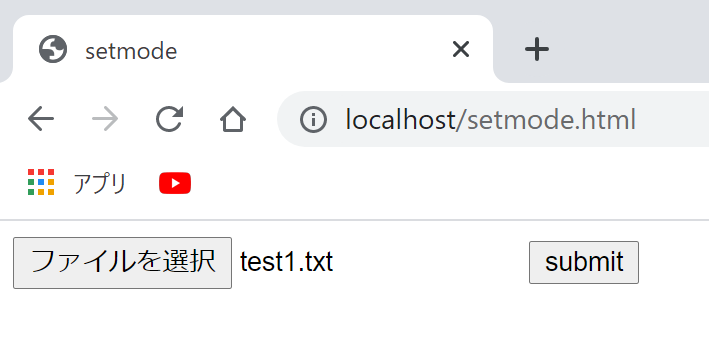
今度はsubmitすると、
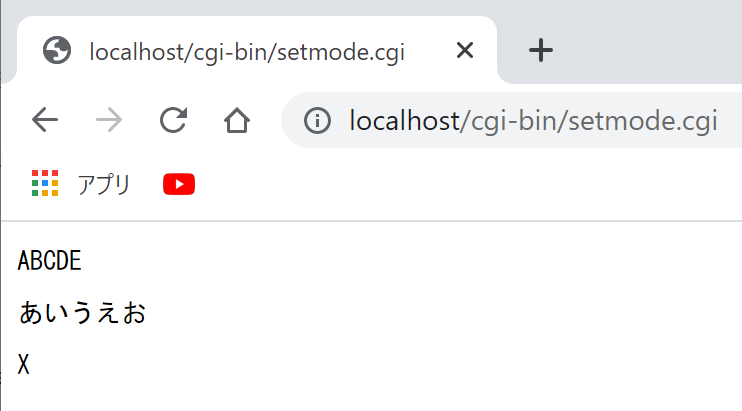
改行が増えていて、最後の2文字を書き込めなかった。
これは、fwriteの時に、"\r\n"が"\r\r\n"に変換されているのが問題なので、
fwriteの前に、
を置いて、バイナリのまま出力するようにする。
これで、
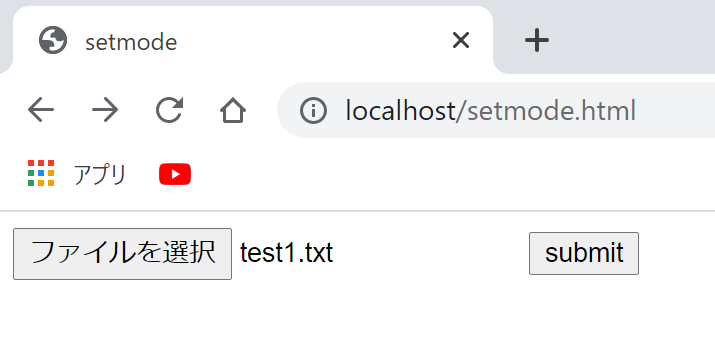
submitすると、
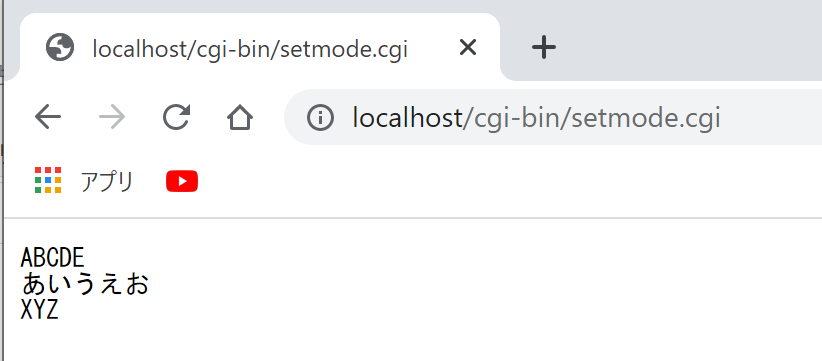
こうなる。
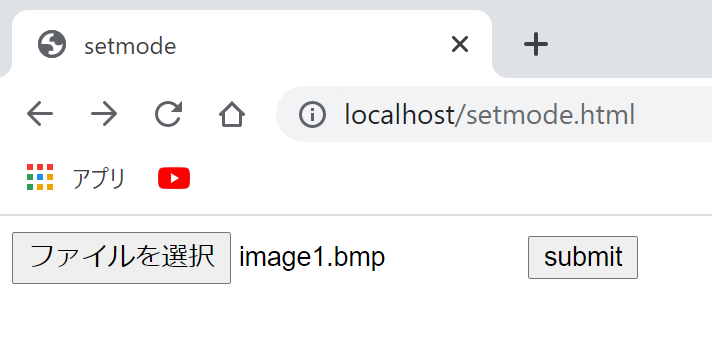
画像も、
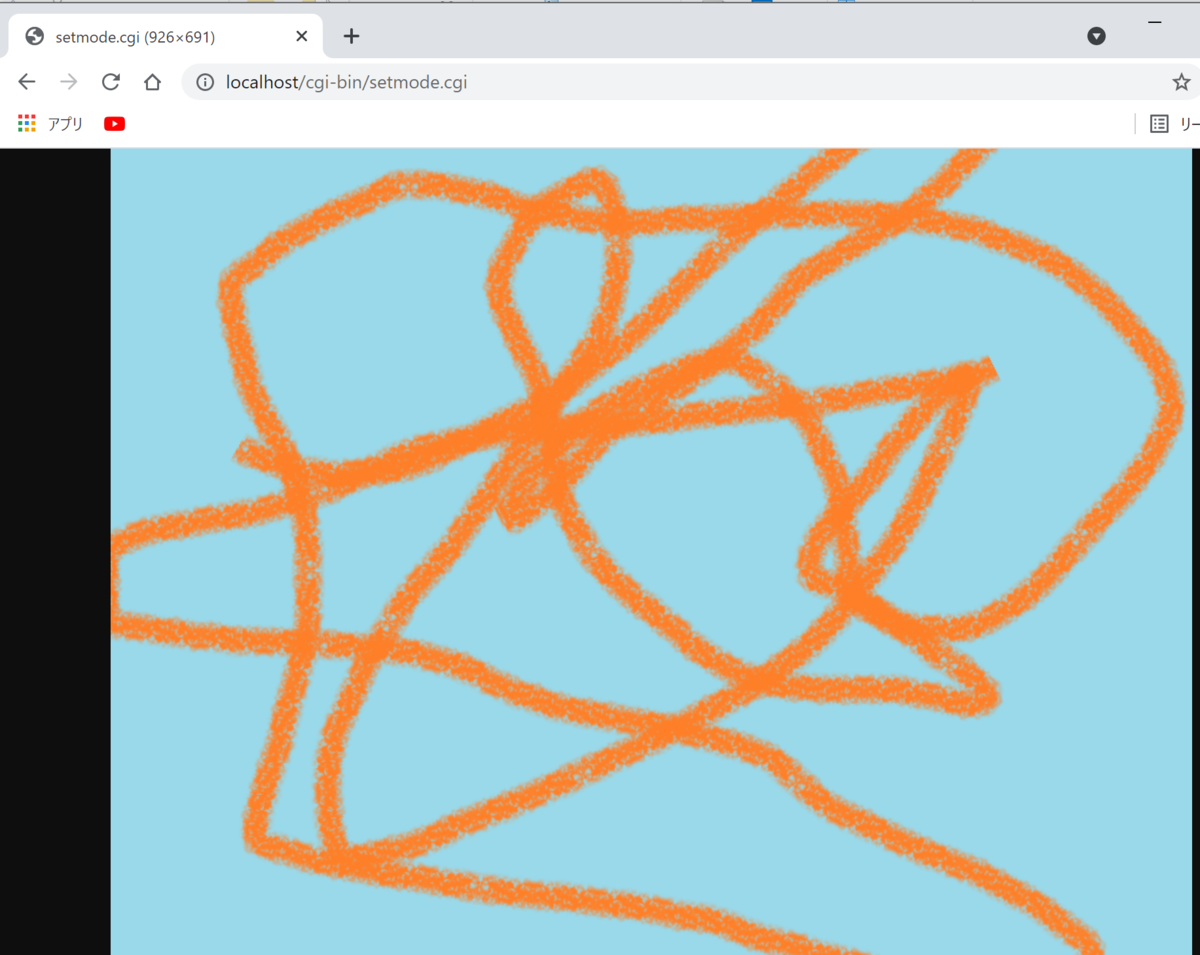
表示できる。
Sample/c/setmode/setmode/src/setmode at master · bg1bgst333/Sample · GitHub